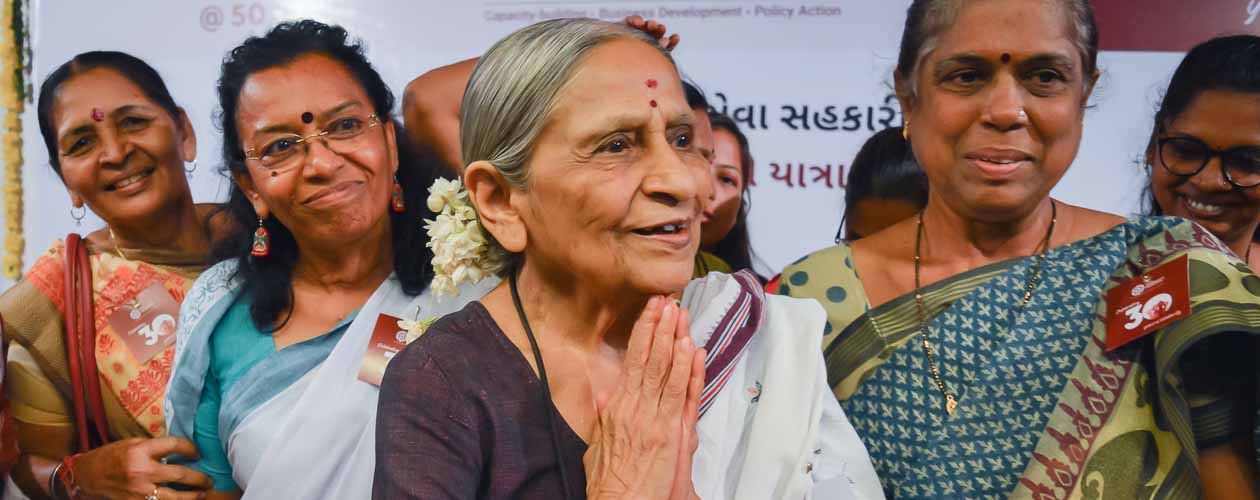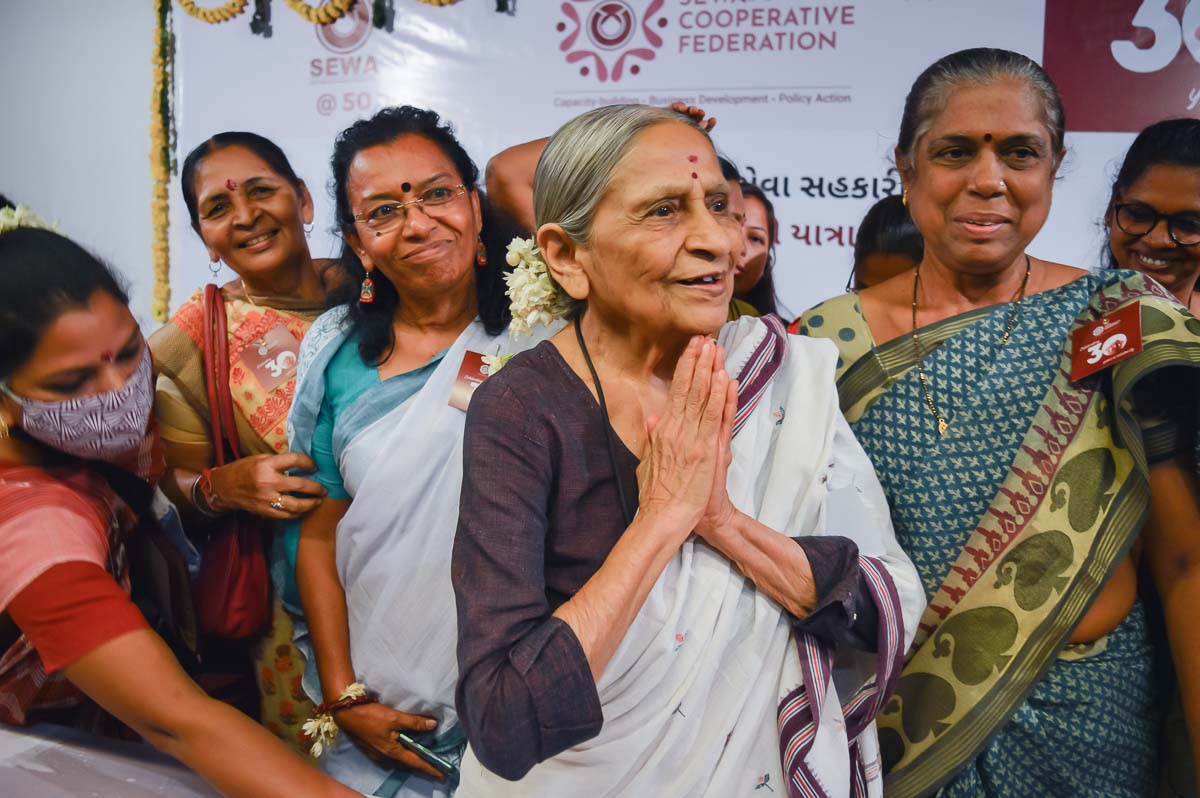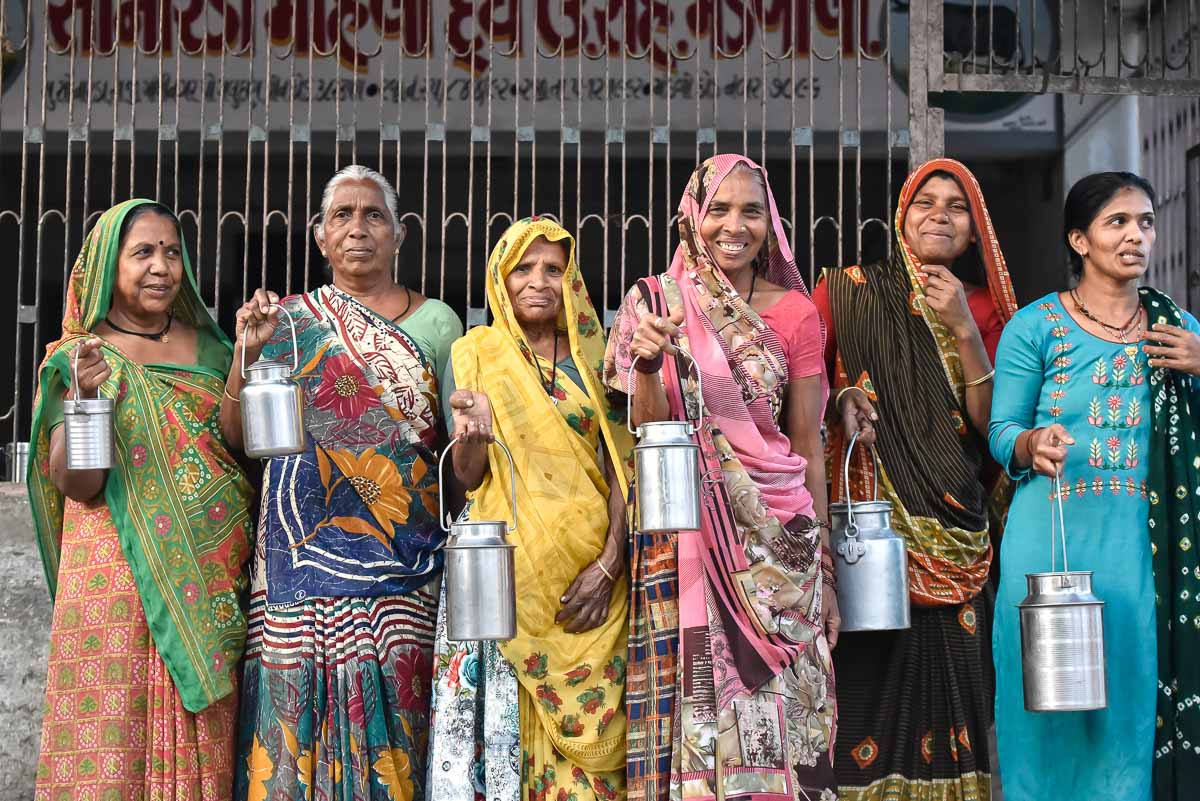Introducing SEWA
SEWA Cooperative Federation’s history can be traced back to the struggle for workers’ rights led by the Self-Employed Women’s Association (SEWA).

Introduction
SEWA Cooperative Federation’s history can be traced back to the struggle for workers’ rights led by the Self-Employed Women’s Association (SEWA). Since its inception in the 1970s, the SEWA trade union has worked actively to promote the rights of women working in the informal sector. Today, SEWA is one of India’s largest and oldest national trade unions of informal workers with over 1.8 million active members across 18 states.
Alongside workers’ rights, SEWA identified the need for sustainable livelihood for informal women workers. The Self-Employed Women’s Association (SEWA) Cooperative Federation has been working with and for women workers of the informal economy since 1992. The Federation is committed to women’s economic empowerment and self-reliance through collective enterprises that are owned, managed and run by women. Our role is to provide a stable support system to women’s enterprises, nationally and internationally, enabling sustainability both financially and in terms of decision making.

The Federation supports over 100 women-owned and women-led cooperatives across 6 sectors — Agriculture, Dairy, Artisans, Services, Savings & Credit, and Labour, with the view of achieving full employment and self-reliance for informal women workers. The Federation provides support services that enable these cooperatives and other collective businesses of informal women workers to become viable, to innovate, and to scale.

Our Services
With the help of a panel of experts and experienced professionals, the SEWA Federation provides specialised services to women’s collective enterprises across sectors, to enable them to become sustainable businesses. These services include:
- Human Resources and Administration
- Capacity Building
- Finance & Accounting
- Marketing
- Communications
- Research
Our Impact
Linked 300,000 women with work and income security
110 women’s collective enterprises incubated, promoted and supported
4000 + grassroots leaders creating change at the community level
Reaching 1,700,000 individuals in 2021–2022

Learn More about SEWA's History
This 9-minute video tells the story of the SEWA cooperative federation.

SEWA continues its more than 4 decade March for doosri azadi, or second freedom, in 2017. SEWA enabled its 1.4 million poor women workers across 15 states of India to move out from the vicious circle of poverty directly addressing SDG-1. SEWA has achieved this through organizing its members and bringing them into the mainstream economy. In 2017 SEWA moved to the digital platform. Its entire rural membership in Gujarat was renewed using SEWA’s own digital application. SEWA is also preparing to position itself for the future for its millennium members. SEWA’s Director for economic development and rural organizing was invited as commissioner to the ILO's global Commission on future of work.
Along with digital organizing, in 2017 SEWA initiated partnerships with several platforms to initiate retailing and livelihood opportunities. SEWA's rural and urban members and producers got registered as sellers on Amazon's Saheli to access newer markets. Similarly, SEWA’s rural members’ homes were listed on Airbnb. We at SEWA call it Hum Sub Ek Hain. The message is to be a global citizen building relationships across borders, and we are related unknowingly or knowingly since our actions impact at three levels: self, society and nature, as we all live under one sky, grow our food on one ground, we have one underground source of water. And so SEWA tries to invest in people to build one citizenship, thereby nurturing the society, leading to peace, to exchange of greetings, information skills, language, experiences of family life and work.
Rudi, a pioneering food value chain owned and managed by small and marginal women farmers marched ahead with a turnover of rupees 12 crore 56 lakhs resulting in food security for 65,000 poor households, access to market and sustainable livelihood to 15,000 small and marginal farmers and agriculture workers, thereby strengthening the local economy.
With a notion to bring technology in the hands of the poor, ‘Rudi Sandesha Vyavahar’, with a graphical interface with E-rural retailing functionality and ‘M bacchhat’, savings and credit applications continued and is being used by the barefoot entrepreneurs and bankers to manage the procurement, sales, inventories, earnings, savings, recording entries, maintaining cash registers, etc. SEWA trade facilitation center, a company owned by 15,000 artisan members, is remarkably climbing ladders with a turnover of rupees 4 crore thereby providing sustainable livelihoods to 2,500 poor artistic members. SEWA trade facilitation center is a resource organization whose model has been replicated in building supply chains of home-based workers and small farmers in the neighboring countries of Afghanistan, Nepal, Sri Lanka and Bhutan. The young artisans, daughters, and daughters-in-laws rural fashion line, ‘Harki’ progressed successfully with their mark of identity.
Over a period of years SEWA has emerged as a movement and its approaches and strategies under the leadership of poor women is progressing in neighboring South countries. In Afghanistan along with local sister organization Sabah Bagh-e-Khazana Social Association, SEWA’s work continues and has more matured and strengthened vocational skill centers with increased and sustainable growth. Similarly in Sri Lanka the SEWA Sisters organization women's self-employed development cooperative society is also progressing and has spread over two districts of Batticaloa and Ampara. More than two thousand more affected members continue their activities in four community learning trade facilitation centres and women operation food centres, providing forward linkages to grassroots members. The turnover of Sri Lankan rupees 52 lakh 96,927.
Our campaign Women, Water and Work agriculture and ‘Hariyali’ in the year 2017 progressed and continues to turn various crises such as global warming, globalization, climate change, ground water crisis, inaccessibility to potable water, affordable energy, into opportunities. ‘Hariyali’, the energy initiative of SEWA, gave access to solar pumps to 754 salt and agriculture farmers with improved productivity and incomes, enabling them to step out of poverty. The mixed grid approach continued to help women members to identify their energy needs and budgets and enabled Hariyali to customize energy products and services to their trades and cash flows making it affordable for the women to improve their livelihoods through an access to energy.
Members across states continued progressing with clean cooking solutions through 3A solutions: awareness, availability and affordability. Under its agriculture campaign SEWA progressed its climate resilient agriculture practices through continued promotion of organic farming through use of vermicompost and compost pits in more than thousand acres of land by farmers field schools. To safeguard the farmers against climate risks SEWA continued encouraging setting up of seed banks at every village so that farmers have access to good quality certified seeds, tools, and equipment libraries, safety net to small and marginal farmers through rainfall insurance spot and future price information ‘Rudi’ agribusiness supply chain and rural distribution network and much more.
The Women, Water and Work, SEWAs millennium water campaign under the leadership of women, continued witnessing and promoting barefoot water managers and technicians moving towards achieving the objective of promoting clean drinking water at the doorsteps, maximizing rainwater harvesting and reduced use of underground water thereby working towards climate change mitigation, better health, and strengthening and creating water based livelihood opportunities. The campaign also continued and strengthened in Dungarpur, Rajasthan under the WASH program and is also working towards mitigation of fluorosis.
A cadre of 1785 master trainers were trained by SEWA Manager Ni school (SMS) across various livelihood opportunities in India and neighboring countries. SMS marched ahead in hospitality management training under Hum Sub Ek Hain and sharpened the skills of the host members in communications, technology, cuisine, language etc. and AFCAT (Air Force Common Admission Test) trainings for developing and grooming skills of members. The impacts of the trainings by SEWA Manager Ni school resulted in employment opportunities for 9,912 members in various decent jobs, increased entrepreneurship including selling of herbal products locally. SEWA’s tested approaches and strategies spread ahead to partner with NERLP for setting up community learning centres in Nagaland and Sikkim and trained 167 master trainers on various activities, and facilitated 1448 members with managerial livelihoods training.
SEWA’s work in Jammu and Kashmir is expanded to the Ganderbai district. Women across 80 villages earn livelihood through various trade activities such as crafts, embroidery, agriculture, etc. 1,500 women received training in stitching, garmenting, handloom, agriculture and solar, thus marching towards livelihood opportunities crossing the barriers and rebuilding their lives through economic rehabilitation. SEWA in convergence with a border security force and the Government of India got the opportunity to conduct ‘bharat darshan’ for the Jammu and Kashmir members and their families which gave an opportunity to understand the culture, tradition, cuisine, etc. along with building trust as well as an exposure and opportunity to understand various trades and livelihood avenues practiced by SEWA in other states of India.
SEWA also started its work in Leh and Ladakh to facilitate training to 2,000 members on weaving, stitching and food processing to developing a cadre of master trainers. During the training period the master trainers stay at SEWA members home state enrich their experience and enlighten them with initiating this India area as well. Thus SEWA, a national union of informal sector women workers, is striving to build enterprises and tap opportunities in global economy enabling them to converge with the future of work, enter into the mainstream economy, fight against poverty, attain economic freedom, dignity, and self-reliance.
Contribute
Technology and social justice are complex topics that require a diversity of perspectives and contributions. Join the conversation by sharing your thoughts, questions, critiques, and relevant resources with us at info@datacommunities.ca.